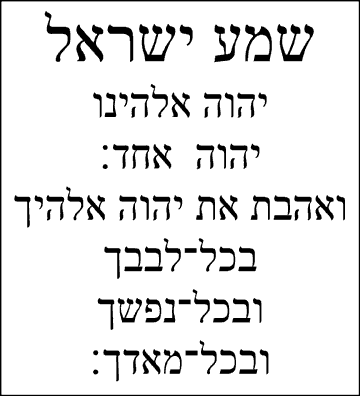Loving God with all our heart, soul, and excellence
COFFEE WITH WARREN, with Warren Harbeck
Cochrane Eagle, March 10, 2010

The opening words of the Shema, the Hebrew affirmation of singular loyalty and devotion to God taken from Deuteronomy 6:4–5, call for a commitment in attitude, abilities, and life itself. Graphic by Warren Harbeck
There is a beloved prayer in Judaism that is fundamental to Christianity, as well. As we approach the Jewish Passover and Christian Holy Week, I’d like to reflect on what Jesus called “the first and greatest commandment” and what Jews call simply the Shema.
Shema (pronounced sh’-MAH) is a Hebrew word meaning “hear.” It is the first word in the ancient text of Deuteronomy 6:4-5, the beginning of Judaism’s great confession of faith. In the Tanakh, the Jewish Publication Society’s translation of the Hebrew Scriptures, it reads:
“Hear, O Israel! The Lord is our God, the Lord alone. You shall love the Lord your God with all your heart and with all your soul and with all your might.”
Devout Jews recite this prayer morning and night, as well as in formal liturgies. It is an affirmation of their covenant commitment to live according to the Torah, the laws of God given through Moses.
The importance of taking to heart these words is spelled out in the verses that follow. They are to be taught to one’s children, recited everywhere and everywhen, bound to one’s person, and affixed to the doorposts of one’s house.
I was overjoyed a while ago to come across a modern musical interpretation of the Shema on YouTube, the “Ecstatic Shema Yisrael Chant.” The stirring chant echoes in my mind daily now, a reminder of the faith and values that I, a Christian, share with my Jewish brothers and sisters.